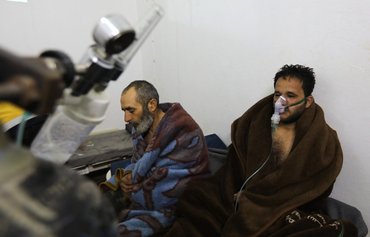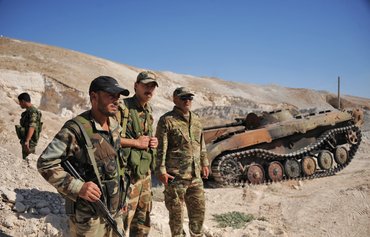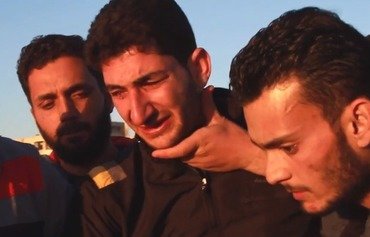The global chemical weapons watchdog on Wednesday (April 8th) for the first time explicitly blamed the Syrian regime for toxic attacks, saying its air force used the nerve gas sarin and chlorine three times in 2017.
The confirmation by the Organisation for the Prohibition of Chemical Weapons (OPCW) of the regime's use of internationally banned chemical weapons on civilian areas has several implications, a Syrian journalist told Diyaruna.
The OPCW's findings are the key to holding the Syrian regime to account for its actions, journalist Mohamed al-Abdullah said.
They also provide evidence of the Syrian regime's lies and denial that it has used these substances, and refute its claims that the accusation was part of a media campaign waged against it, he told Diyaruna.
![A woman who was exposed to toxic gases in Latamneh on March 25th, 2017, receives oxygen. [Screenshot from video, Halab today]](/cnmi_di/images/2020/04/09/23454-Latamneh-toxic-gas-600_384.jpg)
A woman who was exposed to toxic gases in Latamneh on March 25th, 2017, receives oxygen. [Screenshot from video, Halab today]
![Two members of the White Helmets wear protective masks while inspecting sites targeted with toxic gases in Latamneh on March 25th, 2017. [Screenshot from video, Halab today]](/cnmi_di/images/2020/04/09/23455-White-Helmets-inspection-600_384.jpg)
Two members of the White Helmets wear protective masks while inspecting sites targeted with toxic gases in Latamneh on March 25th, 2017. [Screenshot from video, Halab today]
The OPCW's confirmation that Syrian regime forces carried out chemical attacks on the town of Latamneh in northern rural Hama province also implicates the regime's supporters, particularly Russia, he said.
Russia has stated more than once that these facts were merely baseless allegations, al-Abdullah noted.
The OPCW's report also refutes the disinformation spread in Syrian and Russian media, with some reports claiming the attacks were plotted by opposition groups in an attempt to smear the regime and its allies, he said.
Al-Abdullah expressed his hope that the OPCW's report will facilitate the prosecution of the Syrian regime before the international courts, saying the attacks fall within the categories of war crimes and crimes against humanity.
Syrian regime to blame
The OPCW's findings came in the first report from a new investigative team set up to identify the perpetrators of attacks in Syria's ongoing war.
OPCW member states agreed two years ago to give the watchdog new powers to attribute blame for attacks, despite the objections of Syria and its ally Russia.
Previously, it had only been able to say whether chemical strikes had occurred but without naming the perpetrators.
The report said two Syrian Arab Air Force Sukhoi SU-22 fighter jets dropped two bombs containing sarin on Latamneh on March 24th and 30th, 2017.
A Syrian military helicopter dropped a cylinder containing chlorine on a hospital in the same village on March 25th that year, the report said.
In total, 106 people were affected by the attacks, the OPCW said.
The Latamneh strikes came just days before another deadly sarin assault in nearby Khan Sheikhun on April 4th that killed more than 80 people.
The OPCW team is expected to deal at a later date with an alleged 2018 chlorine attack in the Syrian town of Douma in which at least 40 people died.
'Orders from senior commanders'
The OPCW said the new Investigation and Identification Team (IIT) could not identify the precise chain of command, but that orders for the attacks must have come from senior commanders.
"Attacks of such a strategic nature would have only taken place on the basis of orders from the higher authorities of the Syrian Arab Republic military command," IIT co-ordinator Santiago Onate-Laborde said.
"Even if authority can be delegated, responsibility cannot. In the end, the IIT was unable to identify any other plausible explanation," he said in a statement.
US Secretary of State Mike Pompeo said "no amount of disinformation from [Syrian president Bashar] al-Assad's enablers in Russia and Iran can hide the fact that the al-Assad regime is responsible for numerous chemical weapons attacks".
"Such a blatant violation of international law must not go unpunished," said German Foreign Minister Heiko Maas.
Human Rights Watch's UN director Louis Charbonneau said the "OPCW's conclusions should be used to support criminal justice for the individuals responsible".
But OPCW head Fernando Arias pointed out that the IIT was not there to name individuals, neither did it have the power to make findings on the non-compliance of the convention on chemical weapons.
It was now up to OPCW member states, the UN Secretary-General "and the international community as a whole to take any further action they deem appropriate and necessary", Arias said.

![A nurse who inhaled toxic gases in the town of Latamneh in rural Hama after a Syrian regime airstrike receives oxygen through a mask. [Screenshot from video, Halab today]](/cnmi_di/images/2020/04/09/23453-Latamneh-Hama-patient-600_384.jpg)






